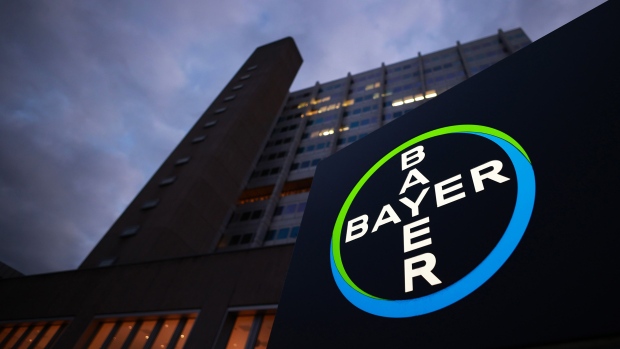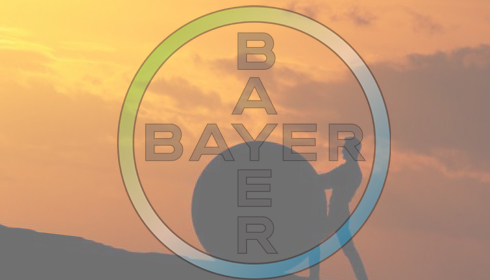Wed, November 22, 2023

By Shankar Ramakrishnan
(Reuters) -Bayer held a call with investors on Monday after a raft of bad news led some of them to question whether the German group had been upfront about its prospects ahead of a $5.75 billion bond issuance, three sources familiar with the situation said on Wednesday.
The bad news prompted some bond investors to question whether Bayer should sweeten the terms of the deal or outright pull it, one of the sources said.
The drug-to-pesticides group priced the investment grade bond on Thursday last week, with the deal closing on Tuesday.
On Sunday, it was hit by a major drug development setback when it aborted a large late-stage trial testing a new anti-clotting drug, that promised billions in revenue, acting on recommendation by an independent trial monitoring board.
Then in two separate lawsuits, Bayer was ordered on Friday to pay $1.56 billion to plaintiffs over its Roundup weed-killer, followed by another order on Monday to pay $165 million to employees of a school northeast of Seattle.
"From our conversations with clients, many are angry and are seriously wondering whether Bayer management rushed to bring the deal ahead of the news," said Andrew Brady, CreditSights head of basic industries research, referring to investors.
A Bayer spokesperson declined comment.
The company's bankers held a call with some of the top investors on Monday in a bid to placate them, two of the sources said.
On the call, the investors asked for clarity on whether the bad news would have material impact on the company’s earnings, one of the sources said. The company told investors it had reserves to deal with Roundup litigation, and could not have predicted the jury verdicts, the source said.
It is rare for investment-grade bonds to be pulled after they have priced, according to the sources, who are market participants.
In March 2021, Nomura Holdings flagged a possible $2 billion loss at a U.S. subsidiary, and shelved a hefty bond issuance.
Bayer priced bonds with maturities between three to 30 years. It was the 10th largest investment grade bond deal by an industrial company this year and attracted more than $22 billion in orders, according to Informa Global Markets.
Citigroup, JP Morgan, SMBC Nikko Securities America and Wells Fargo were the bookrunners on the deal.
All the banks declined comment.
The credit spreads, or the premium charged over Treasuries, on some of the bonds on Wednesday were bid 5 basis points to 23 basis points wider than where they priced last Thursday.
The events were "not enough to trigger a material adverse change clause in bond documents for investors to ask to be paid back," said CreditSights' Brady.
(Reporting by Shankar Ramakrishnan; additional reporting by Ludwig Burger and Mike Erman; editing by Paritosh Bansal and Marguerita Choy)
Bayer’s Drug and Legal Blows Leave CEO Less Room to Maneuver
, Bloomberg News

(Bloomberg) -- Bayer AG Chief Executive Officer Bill Anderson told investors that recent drug pipeline and legal setbacks have left the German company less room for maneuver as it considers a breakup.
The pharma, agriculture and consumer health conglomerate is likely to be saddled with more debt and less revenue than it had expected going forward, he said. That could affect the relative attractiveness of different restructuring approaches, as Bayer can’t overburden any new corporate entities with borrowings.
“The impact of these recent events doesn’t change what our strategic options are,” Anderson said on a call with investors Tuesday, a day after shares plunged the most in Bayer’s history. “It just may mean that some of those conditions are a little tighter than they otherwise would be.”
Anderson is dealing with the fallout of Bayer’s decision on Sunday to end a late-stage test for the anti-thrombotic drug asundexian due to a lack of efficacy. In January, Bayer projected that asundexian could reach peak sales of more than €5 billion ($5.5 billion), making it the largest among Bayer’s four “key growth drivers” for the pharma division.
On Tuesday’s call, Bayer officials confirmed plans to continue a separate late-stage trial of the drug on another group of patients, which — if successful — could mean Bayer would make money from it as early as 2026. Bayer is also reevaluating plans for a third trial that would include patients who are age 65 and up. Nonetheless, the poor results from the main asundexian trial were surprising and will force the company to revisit its projected sales for the medicine.
The pipeline setback came two days after Bayer’s Monsanto unit was ordered by a Missouri jury to pay more than $1.5 billion to three former Roundup users who blamed their cancers on the product in one of its largest trial losses over the herbicide. Bayer says it will appeal the ruling and insists the product is safe.
Bayer’s shares plunged 18% on Monday, and were little changed Tuesday. The stock has dropped 30% this year.
The events raise the stakes for Anderson, who joined the company this spring and took over as CEO in June, as he weighs a potential breakup of the conglomerate.
Anderson said he’s pushing ahead with his review, noting that he’s still open to either selling off the consumer health unit, listing it as a separate entity or spinning it off. But each of those options has a different time line in terms of raising funds and paying down debt. “That’s the kind of evaluation that we’re doing,” he said.
While he’s also considering separating the crop science division, Anderson noted that it would be easier to do so if there was a positive outlook in the agricultural commodities market and more certainty around litigation over products like Roundup.
“There’s no secret that those are general factors that we have to consider,” he said.
--With assistance from Thomas Mulier.
©2023 Bloomberg L.P.
Following setbacks, Bayer faces uphill task for its corporate overhaul: Analysts
November 22, 2023
After a challenging week marked by setbacks in both clinical trials and legal battles, Bayer's plans for a corporate overhaul are facing increased constraints, say analysts, despite the German conglomerate, led by new CEO Bill Anderson, remaining determined to proceed with its strategic review.
According to media reports, the downturn for Bayer started with the disappointment of its potential blockbuster, asundexian, failing to outperform Bristol Myers Squibb and Pfizer's Eliquis in a phase 3 trial.
Following the blood thinner's efficacy shortcomings, Bayer opted to prematurely halt the study while continuing to advance the asset in stroke treatment.
The company is now pinning its hopes on new drugs like asundexian to offset the impending loss of exclusivity on its Johnson & Johnson-partnered medication, Xarelto.
Added to Bayer's woes, a Missouri jury ordered the conglomerate to pay $1.56 billion to four plaintiffs who claimed that Bayer's Roundup weedkiller caused their cancer. The legal battles over Roundup have been ongoing since Bayer acquired Monsanto in 2018. As a consequence of these setbacks, Bayer's share price experienced a 17.5% decline recently.
The ability of Bayer to restructure its corporate framework by the targeted date of March 5, 2024, is now "further" limited, according to analysts at ODDO BHF.
In a note to clients, the analysts emphasised that the weaker pharmaceutical pipeline may necessitate cash flow from other divisions to compensate for dwindling revenues from drugs losing exclusivity.
Additionally, ongoing litigation risks in Bayer's crop science division could limit the company's flexibility in spinning off or selling the unit, they cautioned.
Despite these challenges, CEO Bill Anderson assured investors on a conference call that the recent events do not alter the strategic options available to Bayer.
He acknowledged that the impact of these events might tighten conditions but maintained that the company's ability to transform its business structure remains intact.
Anderson, who took the helm earlier in the year, faced immediate questions about whether Bayer should spin off its consumer health or crop science divisions. He reiterated the commitment to communicating a detailed strategy and financial targets by 2024, emphasising that the chosen structure must support the goals of speed, innovation, and quality.
Bayer CEO says tougher cash outlook will be considered in overhaul
- Bayer's CEO Bill Anderson said the company's strategic review will consider a potentially tougher outlook for cash flows, after the German conglomerate suffered a major drug development setback, as reported by Yahoo!Finance.
- Late Sunday, Bayer stopped a large late-stage trial testing a new anticoagulant drug due to lack of efficacy, tossing its most promising development project in doubt, and adding to litigation and debt problems.
- "Anything that affects future cash flows negatively just makes that a little tighter," Anderson said on an analyst call Tuesday. He added that "the impact of these recent events does not change what our strategic options are. It just may mean that some of those conditions are a little tighter."
- The CEO has previously said he is considering a break-up of the maker of pharmaceuticals, non-prescription treatments and products for farmers. He gave the example that a potential sale of the consumer products unit to a competitor would generate more cash, and be faster, than a partial spin-off on the stock market and gradual sale of remaining shares over time.
- Stefan Oelrich, head of pharmaceuticals, said that when reviewing the halted trial his team was surprised by a "marked difference" in efficacy of Bayer's asundexian compared to Bristol-Myers Squibb and Pfizer's Eliquis.
- Oelrich noted that the peak sales potential of more than €5 billion would be revised lower, but plans to bring the product to market in 2026 remained in place, albeit for a smaller patient group.




No comments:
Post a Comment